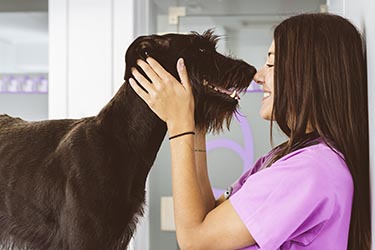Veterinary Staff Hiring Tips

Do’s and don’ts of hiring veterinary staff
Recruiting, training and retaining dedicated, competent employees remains one of the most important decision-making processes that every veterinary practice must manage, master and become adept at doing. The core objective is to consistently find personnel who are an ideal fit to be skilled, exceptional, caring and customer-focused.
There’s an adage that says “hire for attitude and teach aptitude.”
Far too many employers settle for hiring people who minimally satisfy the requirements of a given open position. This is especially true when labor markets are tight and unemployment rates are low. Avoid this trap at all times and at all costs. It’s a dangerous threat to your practice.
While all of us have been guilty of making a poor hire, we need to be on high alert and on-guard to make sure we’re minimizing how frequently this happens. Not only can this be an expensive lesson to learn in terms of both real and opportunity costs, but it can also poison the practice’s reputation and goodwill. Neither scenario is worth the price your practice may pay.
Make sure your staff creates a positive first impression
The most critical first step is to surface qualified candidates. In the past this typically meant running “help wanted” ads in local newspapers; however, this practice is no longer viable, nor effective. A fast-changing environment in which candidates and employers use electronic and/or social media to identify job opportunities has forever altered the manner in which the labor market works. Services such as indeed.com, ziprecruiter.com, and LinkedIn, as well as job boards available through Facebook and Google, are good options to explore and utilize.
Get other staff involved when screening new candidates
There are different schools of thought regarding how to conduct the interview process. While some say candidates should be asked the exact same set of questions as a way to differentiate and compare them to one another, others recommend customizing queries for each candidate. Adhering to the rigor and discipline of the former option is more likely to produce a team of similarly minded individuals working to advance your practice.
The purpose of good, solid interview questions is to create a situation in which candidates feel free to open up, think critically and speak eloquently in response. There’s a plethora of resources available to specify the optimal set of behavior-based questions to ask candidates, including Monster.com, hubspot.com, workbright.com, glassdoor.com, thebalancecareers.com and entrepreneur.com, among others. It’s also a best practice to have current employees participate in the interview process. Doing so helps facilitate their investment and engagement in ensuring the candidate who is chosen will succeed in joining the team.
Checking references gives great insight into problem-solving skills
Once you’ve narrowed down the list of candidates to those you might be interested in hiring, the next step involves checking references. While many veterinary practices delegate this process, doing so undercuts the insight that can be gained by asking someone’s former employer(s) legitimate questions about work ethic, problem solving skills and their ability to work well amongst a team. Remember, you’re looking for the best fit and not necessarily the person who provides the best-sounding, most practiced answers.
There are three options to consider in terms of time, energy and resources — invest, spend or waste. By investing wisely we set the expectation that aligns the culture of our veterinary practice with what we want to provide for our clients. For more insight and advice on making personnel decisions, Veterinary Practice News offers a great article.
Questions? Contact your Covetrus North America sales representative at 855-724-3461 or reach out online to learn more about taking your practice to the next level.


Working Here
Our team members are encouraged to be the best they can be... at Covetrus we believe we impact one another.
Learn MoreNews & Events
FDA Cautions Pet Owners Not to Feed Texas Tripe Inc. Raw Pet Food Due to Salmonella, Listeria Monocytogenes
The U.S. Food and Drug Administration is cautioning pet owners not to feed their pets any of the Texas Tripe brand raw frozen pet food listed below because several samples of Texas Tripe raw pet food have tested positive for Salmonella and/or L. mono.
Careers
Are you looking for a place to let your talents shine? At Covetrus, we help our practitioner customers better serve their patients and take pride in providing the best customer experience possible. Search our open positions to see our available opportunities.
Newsletter
Stay current with what’s going on with Covetrus, subscribe to receive our newsletter and email communications. Subscribers will receive the latest information in practice management, sales and marketing, animal health, and more.



-3-(1).png?sfvrsn=2d806d73_0)

Leave a comment